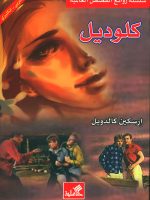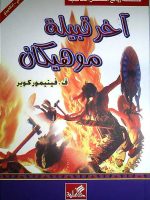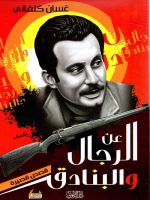Falling on the ground. Glanton turned in the saddle without taking his eyes off the Indians and offered his rifle to the nearest man. This man was Sam Tate, who took the rifle and pulled so hard on his horse that Glanton’s follower and three footmen nearly threw him off. Tate pulled the ram back to support it, knelt, and fired. The horse carrying the wounded chief staggered and galloped, turned the barrels, and fired the second shot, which struck the ground. The Apaches reined in their horses, shouting shrill cries. Glanton leaned forward and whispered in his horse’s ear. The Indians raised their leader onto a new horse, mounted two by two, then slung their horses and rode off again. Glanton had drawn his pistol and signaled it to the men behind him. One of them halted his horse, jumped to the ground, and lay flat on his stomach. He drew his pistol, cocked it, and slid the sling into the saddle, holding the pistol in both hands with his chin buried in the ground. He shot through the sights. The horses were 200 yards away and moving fast. At the second shot, the horse carrying the leader sprang up, and a rider nearby stretched himself out and seized the reins. They were trying to remove the leader from the wounded horse. When the horse collapsed, Glanton was the first to reach the dying man. He knelt, cradling that strange, savage head between his thighs like a bloodied foreign nurse, and challenged the savages with his pistol. They circled the plain, swinging their bows and shooting several arrows at him, then turned and walked away. Blood gushed from the man’s chest, and he turned his wandering eyes to the people. A glassy film appeared over him, and then the capillaries burst. In these two gloomy pools rested the image of a small, splendid sun. He rode back to camp at the front of his small column of men, the chief’s head hanging by his hair from his belt. Men were hanging scalps on pieces of leather thong, and some of the dead lay with strips of hide cut from their backs to be used for belts and horse harness. The dead Mexican, McGill, had his scalp removed. The bloodied skulls were beginning to blacken in the sun. Most of the Indian huts were completely burned… Glanton was circling them, taking a spear and raising the chief’s head above it, where he nodded and looked wickedly. He looked like a carnival head, then got on and called back, “Gather up the spare horses and leave.”
Cormac McCarthy
Cormac McCarthy is an American novelist, playwright, and screenwriter. He was born in Providence, Rhode Island, on July 20, 1933. His real name is Charles McCarthy.
He was born and raised in Tennessee. His father was a prominent lawyer. But McCarthy cut short his studies and managed to earn his living as an auto mechanic. Others describe a harsh life he led; sleeping under bridges and in jail cells, almost like a tramp, just as the hero of his novel “The Lost” later portrayed him, abandoning his bourgeois family and being thrown into the Tennessee River, where he ends up.













Be the first to review “Bloodline or the Redness of Dusk in the West”